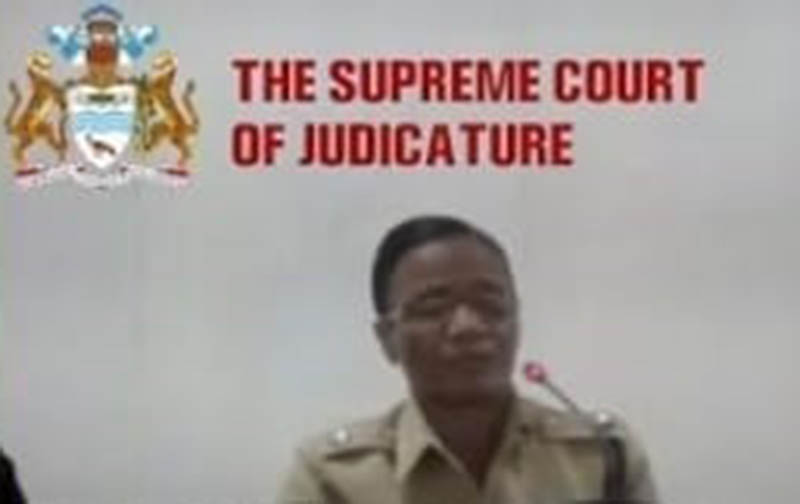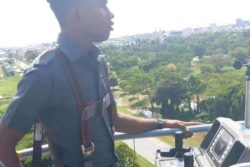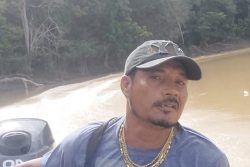International Day against Trafficking in Persons (TIP) will be observed tomorrow, and as part of the local judiciary’s efforts to combat this scourge, it has placed significant emphasis on reporting the crime.
Recognizing underreporting as one of the major hindrances, the Guyana Association of Women Judges (GAWJ)—a major stakeholder in the fight—has over the past couple of days been sensitizing the public and even unsuspecting victims on the indicators of the offence.
To boost reporting, the association has been holding public discussions to highlight the protective measures in place here in Guyana for victims of human trafficking.
Against this background, Second Vice President of the GAWJ—Magistrate Christel Lambert—on a programme hosted on 104.1 FM Radio yesterday morning, made an appeal specifically to undocumented foreign victims to come forward.
Magistrate Lambert said that such victims of human trafficking are protected in such a way that they would not be prosecuted for immigration-related violations.
“So we would like persons who may be victims out there and may be undocumented in our country to know that they will not be prosecuted and that they should not be afraid to come forward,” she urged.
Meanwhile; regarding the trial stage of the proceedings, Chief Magistrate and President of GAWJ Ann McLennan said that the court’s role is to conduct a “victim-centred trauma-informed speedy trial” which is aimed at avoiding re-victimization.
She said that of paramount importance is the victim’s security and noted that as the reason behind a “rigorous” bail hearing for the accused; since TIP is an offence which is usually linked to a network of syndicates and a number of persons.
She said that at the case management conference (CMC) before the trial begins, the victim is provided an advocate.
Outline
Magistrate McLennan said that at that hearing, there is an outline by the Court of the nature of the questions which would be allowed, especially noting that prior sexual conduct is irrelevant when addressing the issue of sexual exploitation committed during the TIP offence.
The victim advocate, she said, is then required to report to the Court directly or through the Prosecutor of the psychological state of the victim to give evidence, and if and whether they are ready to do so.
The Chief Magistrate said that in preparing for trial, the Prosecutor will also advise the Court on the forms of special measures which may be needed for the victim and other witnesses. Such measures she said include, but are not limited to the use of screens, physical or virtual attendance via audio/visual links and provision of an interpreter if required.
Importantly, she noted that TIP trials are held in-camera and are heard on a daily basis until fully completed.
Victims, she added, are allowed to sit with their advocate, a family member or friend; “not to coach them; but to support them; and this person is responsible for advising the Court” of specific needs of the victim for the duration of the trial.
Another protective measure Chief Magistrate McLennan said is that the Court controls the cross-examination of the victim, thus ensuring that questions which are not allowed are not asked; and if asked, are not answered and further that there are no repetitive questions.
At the conclusion of the trial, Magistrate McLennan said that if the defendant has been found guilty, the Court allows an impact statement from the victim which that person can present to the court themselves or through their advocate.
She said that the accused would then be sentenced and restitution, fines and compensation would be awarded by the Court accordingly.
In her contribution to the discussion, Superintendent of Police Shellon Daniels dealt with what she said are the “correct” protective measures offered to the potential victim from a police standpoint.
Against this background she said that confidentiality of the victim and location are of importance to the police when addressing TIP crimes; as is providing effective security for victims such as escorts, with the use of unidentifiable vehicles to and from various courts in cases of physical attendance.
She said that security for not only victims, but their immediate family is also important.
The Superintendent said that victims are also provided the necessary access to all stakeholders for the provision of counselling services, shelters and safe houses for witness protection.
Psychosocial services
In her presentation, representative of the Ministry of Human Services and Social Security (MHSSS), Tanisha Williams-Corbin, said that the ministry plays an integral role in combating human trafficking and continues to work to provide victims with appropriate psychosocial services.
To bolster the services offered by the MHSSS, Williams-Corbin hinted at the drafting of a new TIP Bill which she said should be tabled in the National Assembly by the end of this year and among other things, includes the establishment of a half-way home which caters specifically to migrants from Venezuela.
Of note, she said that Guyana currently has five “safe spaces/shelters” which cater exclusively to victims of human trafficking—children, women and men.
Williams-Corbin said that victims who are reluctant to stay in shelters are provided by the Ministry with rent subsidies and financing to facilitate medical expenses among other things; all aimed at empowering the victims to the point where they can “stand up to their traffickers,” to ensure that they are brought to justice.
As part of activities to mark this year’s observances, Chief Magistrate McLennan on a radio programme on Tuesday said that the Judiciary will be distributing 150 TIP posters in each of the 10 Administrative Regions.
Given the presence of Cubans, Venezuelans and Brazilians here, the Chief Magistrate noted the unique feature of those posters being available in three languages—English, Spanish and Portuguese.
To encourage reporting, Magistrate McLennan had shared the TIP 24-hour hotline numbers which are 227-4082 and 623-5030. Alternatively she said that the Guyana Police Force can be contacted on 225-3650; and that the Spanish hotline can be reached on 624-0079.
She had said it is important for the public to know what TIP “looks like,” and shared what she described as telltale signs that a persons is being trafficked.
On that point she said signs to look for are persons who are forced to beg, bearing frequent injuries or signs of abuse, appear malnourished, work for long hours with hardly any rest and are paid little to no remuneration at all.
She said that avoiding eye-contact and social interactions and not being allowed to speak to family members or others; are also indicators that a person may be a victim.
TIP is an offence in Guyana under Section 3(1) of the Combating of Trafficking in Persons Act.
Persons who are convicted face a penalty in the Magistrate’s Court if tried there, of imprisonment from three to five years and in the High Court from five years to as much as a sentence of life in prison.
Additionally, such convicts are required to pay restitution to their victims, which the Chief Magistrate had explained would include medical treatment, cost of physical and occupational therapy, attorneys’ fees and other losses suffered by the victims.
The theme for this year’s observances is “Use and Abuse of Technology,” focusing on the role of technology as a tool that can both enable and impede human trafficking.








